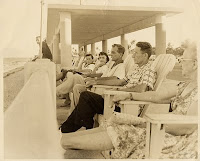Rethinking aging; ageism; aging vibrantly
I've been serving in senior living the past 5 1/2 years. It is such fulfilling work, and I'm honored to be a part. Among other advocacy initiatives as building inclusive communities and connecting with elders on a journey with dementia, there is elder empowerment and aging vibrantly.
It may be easiest to think of elder empowerment and aging vibrantly in terms of their antitheses: "taking care of" seniors; the slow inevitable decline of aging; the emphasis on youth as our future and saviors; the utmost importance of one's career or avocation as their only contribution to society.
Hogwash.
There are multiple movements within the senior services and senior living industries springing from the platform of elder empowerment, including: "culture change," the Eden Alternative, Masterpiece Living, and the Pioneer Network.
Elder empowerment
The message here is that, regardless of one's many years, they are able to decide their path, to contribute, to make a difference. Unlike our often well-meaning approach of "taking care of" seniors in a custodial or matriarchal sense, elder empowerment recognizes that seniors do, can and should continue to lead their lives. And empowerment recognizes the wide variety of manifestations - whether living independently (as much as any of us can be "independent" of others); serving on a task force to change operations within one's senior living community; or deciding when to be assisted with a bath in a community. The outward display of elder empowerment reflects each senior's capability and desire - it is malleable.
The message here is that, regardless of one's many years, they are able to decide their path, to contribute, to make a difference. Unlike our often well-meaning approach of "taking care of" seniors in a custodial or matriarchal sense, elder empowerment recognizes that seniors do, can and should continue to lead their lives. And empowerment recognizes the wide variety of manifestations - whether living independently (as much as any of us can be "independent" of others); serving on a task force to change operations within one's senior living community; or deciding when to be assisted with a bath in a community. The outward display of elder empowerment reflects each senior's capability and desire - it is malleable.
Aging vibrantly
Here is something that bothers me: when a younger person (whether 30 or 60) speaks to an elder in past tense: "you used to have a lot of adventures;" "what did you used to enjoy doing;" or "you were amazing." The problem is that the past tense can imply that there is no present nor future.
Here is something that bothers me: when a younger person (whether 30 or 60) speaks to an elder in past tense: "you used to have a lot of adventures;" "what did you used to enjoy doing;" or "you were amazing." The problem is that the past tense can imply that there is no present nor future.
I love Wendy Lustbader's recent book, Life Gets Better: The Unexpected Pleasures of Growing Older; and Atul Gawande's Being Mortal (so looking forward to the Frontline program of the same name). In such different ways, both question our current societal view of aging as inevitable decline. And the Alive Inside documentary illustrates that elders further in their journey with dementia can still connect.
We've got to change our perspective as a society, appreciating the aging journey and recognizing a much broader sphere of contribution and influence.
This article was also posted on LinkedIn.
This article was also posted on LinkedIn.


Comments
Post a Comment